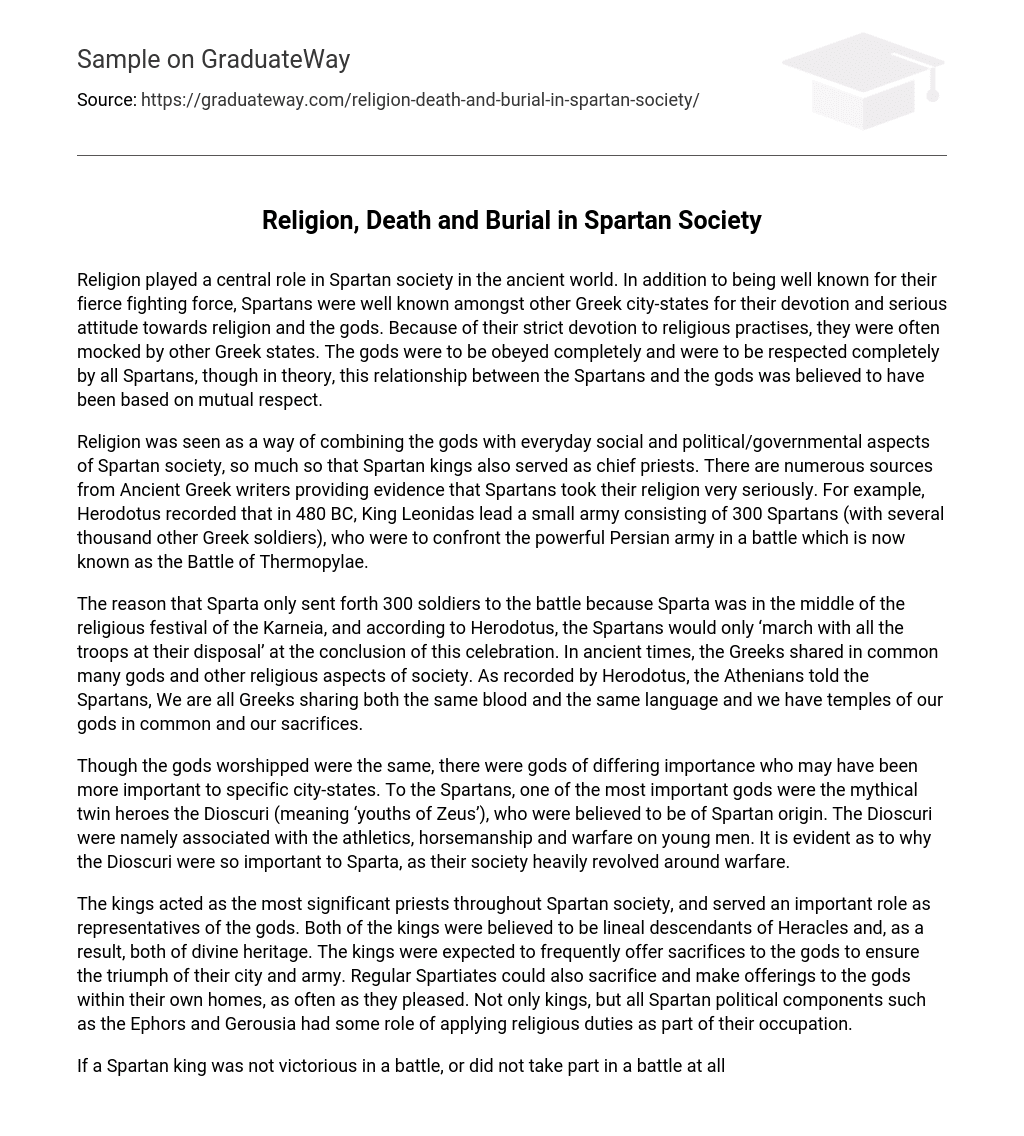Religion held a significant position in the ancient Spartan society. Alongside their renowned reputation for being formidable warriors, Spartans were also famous among other Greek city-states for their earnest devotion and deep seriousness towards religion and the deities. Due to their unwavering commitment to religious rituals, they were frequently ridiculed by other Greek states. It was expected that all Spartans would wholeheartedly obey and highly honor the gods, although theoretically, this connection between the Spartans and the gods was thought to be founded on mutual respect.
Religion had a significant impact on Spartan society, as it served as an avenue to incorporate the gods into various social and political aspects of everyday life. This association was so powerful that Spartan kings held dual roles as both rulers and chief priests. The ancient Greek writers have recorded multiple instances that demonstrate the earnestness with which Spartans embraced their religion. A notable example is found in Herodotus’ narrative of King Leonidas leading a small contingent of 300 Spartans (alongside several thousand other Greek soldiers) during the renowned Battle of Thermopylae in 480 BC.
Herodotus recounts that Sparta’s decision to send only 300 soldiers into battle was influenced by the ongoing religious festival of the Karneia. He documents that the Spartans would mobilize their entire army once the festivities concluded. During ancient times, there existed a shared belief system among Greeks, including common gods and religious practices. Herodotus records the Athenians conveying to the Spartans, “We are all Greeks with shared blood and language, and we hold temples for our deities in common where we offer sacrifices.”
Despite worshipping the same gods, different city-states placed varying importance on certain gods. In Sparta, the mythical twin heroes known as the Dioscuri held significant value. The Dioscuri, meaning ‘youths of Zeus’, were believed to originate from Sparta and were strongly associated with athletics, horsemanship, and warfare among young men. Given Sparta’s heavy emphasis on warfare, it is understandable why the Dioscuri held such high importance to them.
The kings played a crucial role in Spartan society as prominent priests and representatives of the gods. They were considered to be direct descendants of Heracles, making them of divine heritage. Their responsibility included regularly offering sacrifices to the gods to guarantee the success of the city and its army. Regular Spartiates also had the freedom to sacrifice and make offerings to the gods within their own homes. It wasn’t just the kings, but all Spartan political entities, including the Ephors and Gerousia, had religious obligations as part of their duties.
If a Spartan king failed to win a battle or did not participate in one, he could receive complete forgiveness if he had a valid religious excuse. Herodotus offers an example of this. He recounted the famous tale of Pheidippides, an Athenian runner who was dispatched to Sparta to request aid for the imminent Battle of Marathon. Despite being moved by the plea and being willing to send support, the Spartans were unable to do so promptly due to their adherence to their law. The ninth day of the month had arrived, and they believed they were prohibited from engaging in battle until the moon reached its full phase.
Religion had a significant impact on the burial practices and rituals in Spartan society. Plutarch, citing Lycurgus, noted that only men who died in battle and women who died in childbirth received a marked grave or tomb. Others were laid to rest in pits according to Spartan religious customs. In line with these customs, Spartans mourned the loss of their kin for a designated period of 11 days. On the twelfth day, a sacrifice was made to Demeter, the Greek goddess associated with harvest and the cycle of life and death. This sacrifice symbolized the conclusion of grieving.
When the king passed away, the Spartans dispatched horsemen across Laconia to disseminate the information. According to Herodotus, messengers spread news of the king’s demise throughout the entire nation, while women in the capital went around striking cauldrons. This act served as a signal for one man and one woman from each household to don mourning attire, as failure to do so would result in a hefty fine. Numerous Laconians were compelled to attend the king’s funeral and publicly display profound grief. In instances where the king died in battle, a statue commemorating him would be crafted and placed at his burial site.
In contrast to other Greek city states like Athens, the city of Sparta had a unique approach to burial. Unlike Athens, who buried their citizens outside the city, Sparta conducted burials within the city walls. The purpose behind this practice was to encourage Spartans to embrace death rather than fear it. This essay has emphasized the importance of religion in Spartan society by utilizing evidence from ancient writers and highlighting Spartan perspectives on religion, different aspects of religion in Spartan society, as well as the rituals associated with death and burial.
Bibliography:
The text provides various sources on Spartan society, specifically focusing on their religion. These sources include Kathryn Welch’s work “Spartan Society to the battle of Leuctra 371 BC” (St John the Evangelist Catholic High School, 2010, pg. 57-60), Plutarch’s “The Lives of Noble Grecians and Romans” (Random House Inc., 1864), a webpage from Charles Sturt University’s Ancient History website, a presentation on SlideShare about Spartan religion and burial practices, and a cached version of an essay by Mrs. Graham on Spartan religion.





